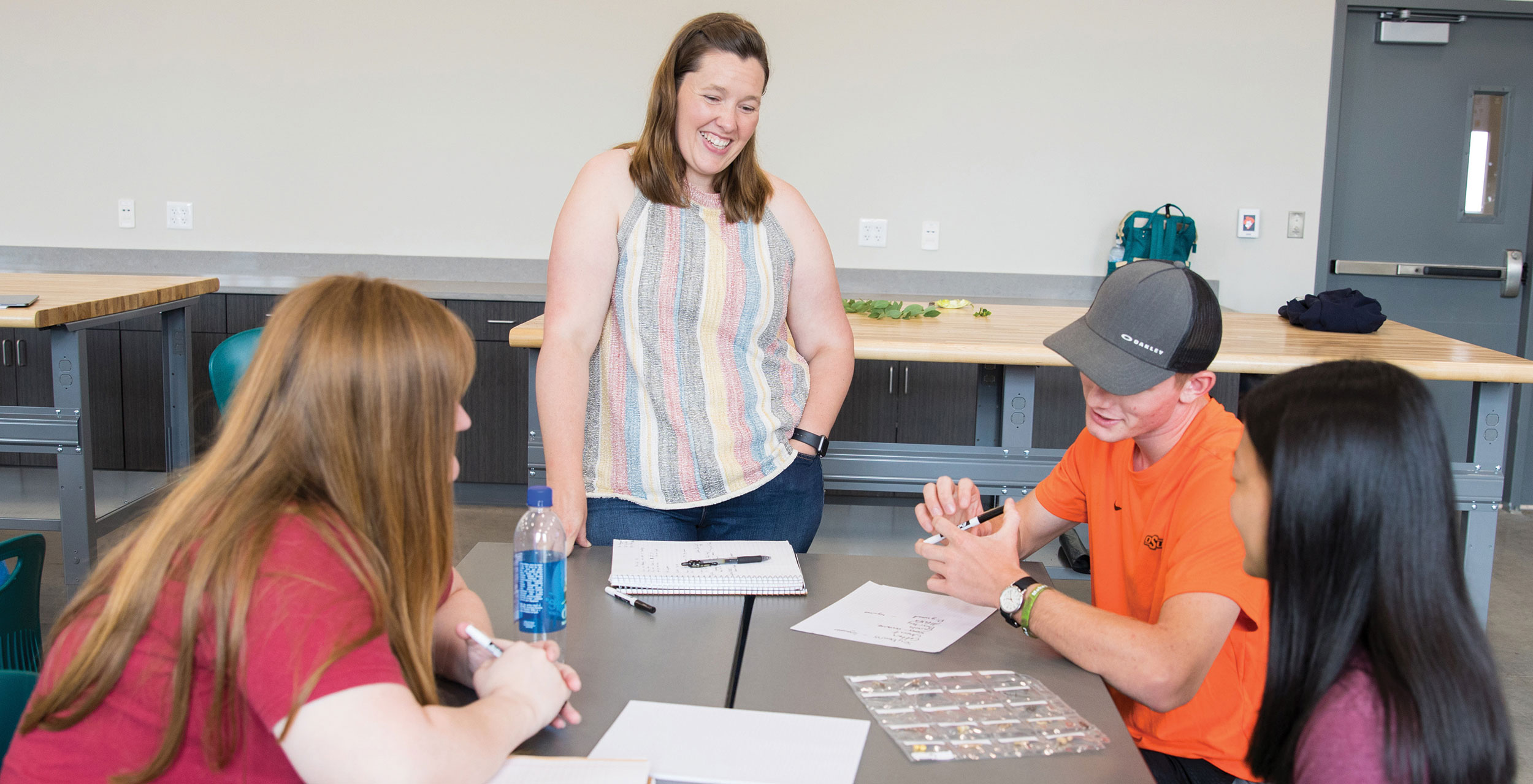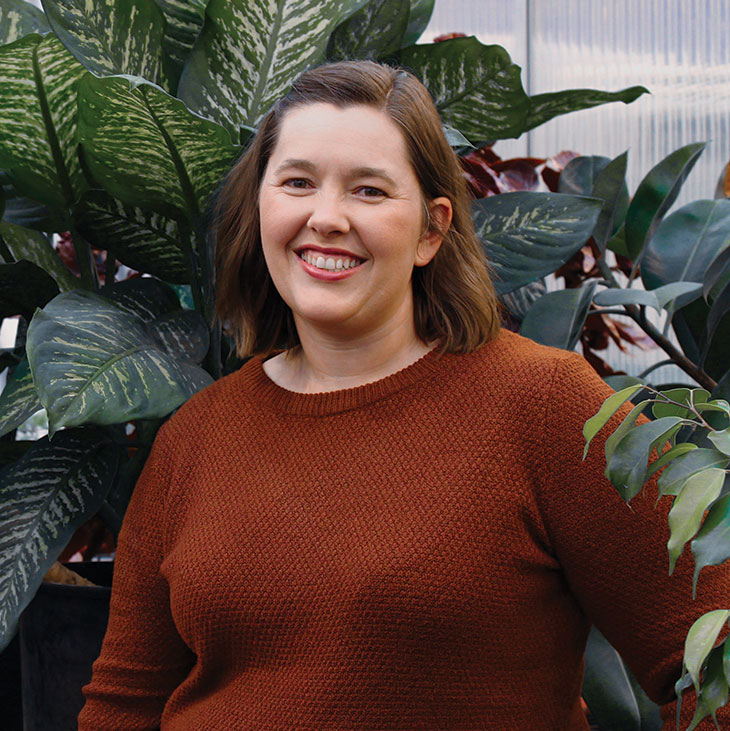
Exceeding Excellence Early On
Friday, December 17, 2021
Media Contact: Samantha Siler | Communications and Marketing Manager | 405-744-2977 | samantha.siler@okstate.edu
Students need teachers who offer them perspective, who give them an opportunity to grow through hands-on learning, and who are leaders, innovators and trailblazers.
Beatrix Haggard, a plant and soil sciences associate professor at Oklahoma State University, received the 2021 United States Department of Agriculture Early Career Teaching Award in November 2021 for doing just that.
“I always knew I wanted to teach,” Haggard said. “I used to hold study sessions in undergrad for my peers because I enjoyed trying to explain things that maybe others don’t understand.”
Haggard grew up in Azle, Texas, a small town northwest of Fort Worth. Although Haggard had no farming or ranching background, her mother encouraged her to get involved with 4-H in junior high.
“I saw a person in a 4-H jacket, and my mom said I needed to get involved in that,” Haggard said. “It all dominoed from there.”
Haggard saw success early in her 4-H projects.
“Literally, my entire agricultural journey started from an English Ivy plant that I grew,” Haggard said.
At her first county fair, Haggard won reserve grand champion with her English Ivy plant and said she earned enough money from the sale to purchase her first show steer.
In high school, Haggard joined the Azle FFA chapter and began thinking about pursuing a degree in agriculture.
“I always wanted to do geology and that was where I was planning on heading,” Haggard said. “The subject was just fascinating to me.”
However, a trip to see her sister who was attending Tarleton State University solidified her decision to pursue a future career in agriculture.
“As a high school senior, I went and met the soils professor at TSU,” Haggard said. “At that point I thought, ‘OK, this is a good mix between agriculture and geology.’”
Haggard earned her undergraduate degree in agronomy and range management in 2008 at TSU with a soils emphasis and a geology minor.
She then attended Louisiana State University, where she earned her doctorate in agronomy in 2012. At LSU also is where she met her husband, Josh Lofton.
“She has always been the dreamer,” Lofton said.
Lofton, who grew up in Broken Arrow, Oklahoma, said they met during graduate school where at one point their desks were beside each other.
“We dated and got married in 2011, and then we both graduated in 2012,” Lofton said. “The first big step in our marriage was trying to figure out with two doctorates in similar fields how we were both going to find jobs.”
Haggard and Lofton started their careers working for LSU — Lofton in a research-heavy position with a little bit of extension and Haggard in an extension-heavy job with a little bit of research, Lofton said.
“She always told me that she wanted to teach, and I wanted to move closer to home eventually,” Lofton said.
In 2015, the couple packed up and moved to Oklahoma. Here, they both joined the OSU Department of Plant and Soil Sciences.
“It was clear during the interview process that Dr. Haggard had a strong work ethic, a positive attitude and a genuine interest in connecting with her students,” said Jeff Edwards, former plant and soils sciences department head.
Haggard said the success she has found in teaching is due to her students. Not only does she enjoy interacting with them, but also she wants to see them enjoy agronomy and succeed as they pursue a career in the field, she said.
“I try to teach that in the real world problems are not always going to have a clear-cut answer,” Haggard said.
In her applied plant class, Haggard works to make the curriculum based on applied crop science principles. Getting her students comfortable with using terminology and addressing concepts that can be difficult to understand, Haggard said, is beneficial for students as they enter the field to work with producers.
“As faculty, we try many different things in the classroom to engage students,” said Cynda Clary, associate dean for the Ferguson College of Agriculture. “Dr. Haggard really takes the time to research what would work best for students.”

Outside of teaching in the classroom, Haggard has been involved in the college’s teaching workshops where she has been a speaker on different topics several times, Clary said.
“Dr. Haggard is always willing to learn from others and share what she has learned,” Clary said.
A year ago, Haggard published a teaching tips article for the North American Colleges and Teachers of Agriculture on things she learned transitioning to online teaching during the COVID-19 pandemic.
“She takes time to connect with students and make sure they are doing OK as people and not just as students in her class,” Clary said. “I admire that about her.”
In addition to teaching courses, Haggard also serves as an academic adviser, the agronomy club adviser and conducts research as the OSU Extension specialist for plant and soil sciences educator training.
She manages her many duties all while she and Lofton raise their two girls: 5-year-old Roslynn and 2-year-old Margaux.
“Roslynn and Margaux would not be the girls they are today if it weren’t for Beatrix,” Lofton said.
One of Haggard’s strengths as a mom is knowing when to push her girls in certain situations and when to pull back in others, Lofton said. This strength is reflected in her teaching method with students, he added.
“It is rare for an early career faculty member to display the level of leadership Dr. Haggard has in our department,” Edwards said. “She rolls with the changes. She adjusts and always has a positive attitude.”
Lofton said Haggard’s ability to integrate new teaching methods in her classes has helped students integrate themselves back into the classroom following COVID-19.
“She is always looking to try something new that will help her connect with students or help a student have that ‘aha’ moment when it comes to crops,” Edwards said. “That’s somebody who is committed to innovation.”
Haggard said she has three goals when it comes to her approach to classroom instruction: have empathy, offer hands-on learning, and help her students to understand not everything is going to have an answer.
Haggard also teaches Introduction to Plant and Soil Systems, known throughout the college as PLNT 1213, a core course for students of any major.
The structured nature of the course is what Ethan Shaw, an entomology sophomore, said makes learning from Haggard so rewarding, easy and fun.
“The textbook and slides for the class were both written by Dr. Haggard and seamlessly mesh with one another,” Shaw said. “Her style of teaching is perfect for me.”
Shaw also is enrolled in the honors section of the course, where this semester students had the opportunity to be hands-on in designing their own experiment from seed to sprout.
“Dr. Haggard is helpful and truly cares about students’ learning,” Shaw said. “She uses topical stories to keep students engaged during class, is passionate about what she is teaching, and is extremely generous.”
A majority of students take PLNT 1213 as a requirement, not as an elective, Haggard said. However, without fail, every semester, Haggard said she will start to get comments about how much students enjoy this class.
“As an entomology major, the classes I have enjoyed most at OSU have been entomology-related,” Shaw said. “However, outside of entomology, honors plant and soil sciences has been the class that I have enjoyed the most.”
Haggard’s mentorship played a huge role in Shaw’s learning experience and new-found love for plants. Shaw went into the class not expecting much, but what he got out of it has proven to be more than valuable, he added.
“She wants to see her students succeed and make the information she is teaching applicable to other disciplines,” Shaw said. “I find myself using information I have learned from her all the time, even outside of school.”
When looking toward the future for the plant and soil sciences department, Haggard said she hopes to see numbers grow and offer more hands-on experiences for students.
“I would love to see all of our classes have some sort of lab or field component,” Haggard said.
The USDA teaching awards program is open to all U.S. faculty and is highly competitive, Clary said.
“Only two award recipients are recognized each year in the early-career teaching award category,” Clary said. “It is an accomplishment to be recognized at this level.”
Haggard said she was shocked when she learned she won the award.
“When you look at it in terms of the whole U.S., that’s pretty daunting,” Haggard said. “There were plenty of other people who would have been just as qualified to win the award.”
While winning the award may have come as a surprise to Haggard, Lofton said he was not surprised when his wife won the award. With her commitment to teaching, innovation and students, she deserves it, Lofton said.
“I am never amazed at what she can do because I see it in her potential every day,” Lofton said.
Story By: Jeanette Furlong | Cowboy Journal
